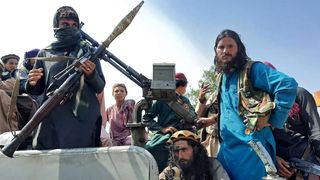What we see unfolding in Afghanistan echoes 1975 with the fall of South Vietnam and Cambodia after America’s withdrawal.
I was a staffer in the US House of Representatives. A group from Cambodia came by our office, pleading for more US aid to save their country. Despondent and desperate, they said terrible things would happen. They pleaded for Congress to do more for their country. I said I did not think more would be done, that the United States could not and would not provide more after all the years of war and loss. That was the mood in the country and in Congress.
They knew what would happen to their country and those they cared about. We know what happened when the Khmer Rouge took complete control of Cambodia.
What we will have this year is a split-screen 9/11: the solemn observances in New York and Washington and Pennsylvania, and the Taliban surrounding, or in control of, Kabul and most of the rest of the country the United States went to war with to avenge the terrorist attacks that originated from there.
It will be a searing side-by-side.
In raw political terms for President Biden, attacks by Republicans and many military and foreign policy veterans are already underway. President George W. Bush has registered his strong disapproval. “The consequences are going to be unbelievably bad.”
If there is wholesale bloodbath by the Taliban – mass executions on the streets, atrocities against women and girls – it will hurt Biden’s standing at the inflection point for his domestic political agenda, even though bringing the troops home is very popular.
But 2021 is not 1975. Ending the Vietnam war signaled exhaustion and retreat for the United States from overseas commitments. And it left a military depleted, with wounded leadership, for many years. The terrible failure under President Carter to rescue the American hostages in Iran, with helicopters crashed in the desert, was four years after Vietnam.
This is not the same. Over the past century, Afghanistan has defeated the British, the Russians and now the Americans and their allies. This is ending a war that could go no further for the United States and NATO after two decades. The objective – stopping the ability for a terrorist strike against the United States emanating from Afghanistan – was achieved a long time ago. As Biden said last week: “They’ve got to fight for themselves, fight for their nation.”
Afghanistan today is not Germany in 1945 with generations of American and allied troops to stay on. Biden is leading the West – not retreating – in today’s arenas of security, competition and engagement, from the pandemic to global warming.
Afghanistan faces renewed agony and horrors as this war ends. It is one thing to take down the terrorists who attacked your homeland and killed nearly 3,000 people. It is another to rebuild a nation, and for that country to be invested in the rebuilding.
The observance of 9/11+20 must also affirm the imperative of learning its lessons.






